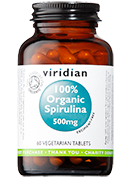
Viridian Organic Spirulina 500mg
What is Spirulina?
Spirulina (Arthrospira platensis) is a simple, one celled form of algae that thrives in warm, alkaline fresh water. The name ‘Spirulina’ is derived from the Latin word for ‘helix’ or ‘spiral’, denoting the physical configuration of the organism when it forms swirling, microscopic strands.
Spirulina is 69 percent complete protein, with all the essential amino acids in perfect balance. In comparison, beef is only 22 percent protein. Spirulina also provides high concentrations of many other nutrients – amino acids, chelated minerals, pigments, rhamnose sugars (complex natural plant sugars), trace elements, enzymes (SOD), and essential fatty acids (both linoleic and linolenic acid) – that are all in an easily assimilable form.
Spirulina is one of the blue-green algae due to the presence of both chlorophyll (green) and phycocyanin (blue) pigments in its cellular structure.
Spirulina lacks cellulose cell walls, unlike other blue/green algae, therefore it can be easily digested. Viridian’s Spirulina has been certified organic by the Soil Association.
